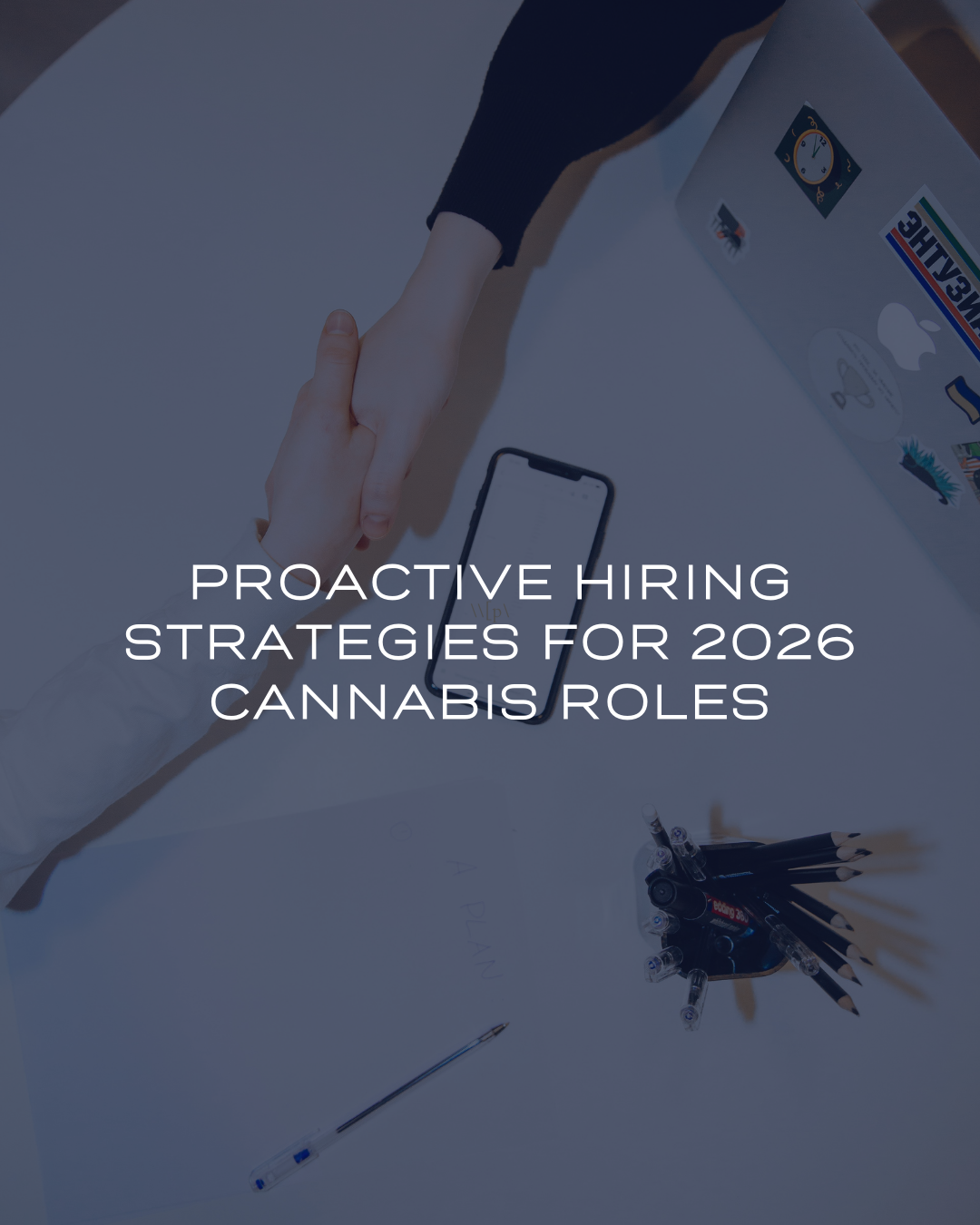
Cannabis Career Blog.
A round-up of job hunting tips, recruitment resources, cannabis industry stats and general musings from a recruitment team dedicated to cannabis.
Global Cannabis Industry Round-Up
Across global cannabis markets, early-year activity was defined by targeted regulatory adjustments, disciplined capital moves, and continued investment in infrastructure — particularly within medical markets. Federal momentum in the U.S., compliance pressure in Canada, and controlled expansion across Europe all point to an industry entering its next phase of maturity.
Executive Search vs In-House Hiring: What’s the Real ROI?
When it comes to senior and executive hiring, the real question isn’t cost—it’s risk and return. A successful leadership hire can shape strategy, culture, and performance for years, while a poor appointment can quietly drain value through stalled execution, team disruption, and lost momentum.
This piece explores when in-house hiring delivers strong ROI, when executive search becomes a strategic advantage, and how leaders should evaluate senior hiring decisions through a long-term investment lens—not a transactional one.
Proactive Hiring Strategies for 2026 Cannabis Roles
As the cannabis industry enters a more disciplined phase of growth, hiring decisions are becoming more deliberate — and more competitive. Companies that plan ahead are securing stronger leadership and specialized talent, while reactive hiring continues to create risk. This article explores how proactive hiring strategies can help cannabis organizations stay competitive in 2026 and beyond.
Global Cannabis Industry Round-Up
December brought targeted regulatory movement across key U.S. states — from tighter advertising rules in New York to finalized frameworks in Colorado and new retail limits in Ohio. While sweeping reform remained elusive, these state-level decisions signal a maturing industry focused on enforcement, clarity, and long-term structure. As operators head into 2026, success will hinge less on expansion and more on navigating an increasingly nuanced regulatory landscape.
Why Strong Leaders Close the Year Before Starting the Next One
How leaders close the year matters. When December ends in chaos, teams carry exhaustion — not momentum — into January. The same is true for hiring. While many companies pause, top talent is reflecting and open to conversations. Staying active in December means less competition, earlier access to strong candidates, and a stronger start to the new year.
Talent Trailblazers: Our Team, Your Recruiter
We’re excited to welcome Tyler Campbell as our new Client Partnerships Manager at White Ash Group. With a background spanning sales, facility development, and cross-industry experience, Tyler brings a sharp perspective on building strong partnerships across the cannabis landscape.
In this Q&A, Tyler shares his career journey, his approach to client relationships, and his outlook on how cannabis teams and culture will continue to evolve.
December Hiring: Securing Top Talent
December may seem like a slow month for hiring, but it’s actually one of the most strategic times to engage top talent. While many companies hit pause, high-performing professionals are reflecting on their careers, opening up to new opportunities, and planning their next move. Employers who stay active — even with lighter touchpoints — gain early access to strong candidates, face far less competition, and enter January with a full pipeline instead of starting from zero.
AI in Recruitment and HR: Efficiency Alone Isn’t Enough
Artificial intelligence is transforming hiring — but faster screening and automated chats don’t always mean better hires. At White Ash Group, we focus on AI tools that enhance human judgment, help recruiters make smarter decisions, and maintain the personal connections that drive long-term success. Discover how the right balance of automation and human insight can make recruitment faster, fairer, and more effective.
Global Cannabis Industry Round-Up
This month, the global cannabis industry is evolving from rapid expansion to strategic, disciplined growth. In Canada, Health Canada’s regulatory consultations and a recent BC retail labour strike signal a focus on operational efficiency. North American operators are sharpening leadership teams, while Europe’s markets — led by Germany’s medical sector — continue to stabilize and expand. Cross-Atlantic talent mobility is rising, as executives with international experience step into senior roles.
Building a High-Performing Executive Team
High-performing executive teams are more than a collection of talented individuals — they are a living system aligned around purpose, strategy, and behaviour. In emerging industries like cannabis or psychedelics, success depends on how well the CEO and their direct reports collaborate, challenge one another, and execute as a unit.
At White Ash Group, we help leadership teams move beyond hierarchy, establish shared decision-making norms, and build the trust and alignment that turn strategy into action. Because in today’s fast-moving markets, the team you build at the top determines the results for the entire organization.
Agile Hiring: Building Teams That Adapt and Innovate
The cannabis industry is evolving faster than most — new markets, shifting regulations, and growing competition demand teams that can move just as quickly. Traditional hiring models focused on experience or tenure no longer cut it. Today’s most successful cannabis companies are embracing agile hiring — recruiting for adaptability, learning agility, and innovation. By prioritizing skills and potential over job titles, leaders can build teams that thrive amid change and position their organizations for long-term growth.
Tailoring Benefits to What Your Team Really Wants
As today’s workforce becomes more diverse across generations and life stages, one-size-fits-all perks no longer cut it. Employees want benefits that reflect their real lives — from mental health and family planning to flexibility and financial wellness. This post explores how leading employers are using data, surveys, and modular benefit programs to design packages that truly resonate with their teams. Learn how personalized benefits can boost engagement, strengthen loyalty, and reduce turnover by up to 44%.
Talent Trailblazers: Our Team, Your Recruiter
With over eight years of experience working alongside cannabis operators worldwide, Jay Kee brings a thoughtful, solutions-driven approach to his new role as Client Partnerships Manager at White Ash Group. In this Q&A, Jay discusses what excites him most about joining the team, how his background in cannabis tech shaped his perspective, and why he remains passionate about the industry’s future.
Why Your CV May Never Reach a Hiring Manager
Most résumés never reach a hiring manager. With over 90% of Fortune 500 companies using applicant tracking systems (ATS), as many as 3 out of 4 applications are filtered out before a human sees them. While these tools promise efficiency, they often amplify bias, rely on rigid keyword-matching, and use opaque assessments that disadvantage many candidates. Both job seekers and employers need to understand how these systems work—and how to navigate them—to avoid missing out on great opportunities and great talent.
Building Morale in Cannabis: Leading Through the Grind
In cannabis, every day feels like an uphill climb — battling price compression, shifting regulations, and intense competition. Leaders can’t control the market, but they can control morale. And in this industry, morale isn’t just a culture perk — it’s a survival strategy. High-morale teams stay resilient, innovate through challenges, and push harder when margins are tight.
Unlocking Growth: Strategies That Stand the Test of Time
Growth isn’t about chasing quick wins or opening more stores—it’s about building resilience. In one of the most competitive and regulated industries in the world, sustainable growth comes from more than just revenue. It’s about cultivating loyal consumers, strengthening brand trust, and scaling operations without losing efficiency or quality.
At White Ash Group, we see the companies that succeed are those that combine customer focus, data-driven decisions, and operational discipline with the agility to adapt. Growth in cannabis is a journey—not a milestone.
AI in Hiring: How Senior Leaders Can Maximize Benefits & Manage Risk
AI is reshaping recruitment with faster screening, data-driven insights, and less admin for hiring teams. But without the right guardrails, it can amplify bias, create compliance risks, and leave candidates disengaged. The best leaders know success comes from blending AI efficiency with the human touch that builds trust and culture.
Ontario’s Recruiter Licensing Law: Key Takeaways for Employers
As of January 1, 2024, recruiters and temporary help agencies must be licensed to operate legally in Ontario under the Employment Standards Act. This new regime introduces strict compliance requirements for agencies—and legal liability for employers who engage unlicensed providers. In this post, we break down what the licensing rules mean, the risks of non-compliance, and the proactive steps employers should take to protect their business.
New Hiring Law Will Change Recruitment Practices in Ontario
Ontario’s new “duty to inform” hiring rule, taking effect January 1, 2026, will require employers to notify all interviewed candidates of their application outcome within 45 days.
While the regulation applies across all industries, it holds particular significance for cannabis employers—who often manage high-volume recruitment and face additional compliance demands. This article breaks down what’s changing, why it matters, and how cannabis businesses can navigate the shift to ensure strong, transparent hiring practices.
Burnout: How to Spot It — And What To Do About It
Burnout isn’t about individual weakness — it’s a systemic issue rooted in how work is designed and led. In this Insight Article, we explore the early signs of a burnout culture, why it’s more prevalent than many leaders realize, and what it really takes to address it. From sustainable workload design to leadership behaviours that prioritize wellbeing, we unpack practical, evidence-backed ways to create cultures where people can perform — without burning out.




















